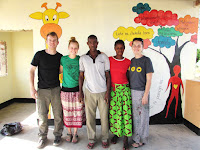It’s been nearly a year since we first visited Buhangija, experienced
the unmistakable odour of suncream mixed with dirt, met Claire and thought
that maybe there might be something we could do. We still get emails and
comments about our first ‘Buhangija NurserySchool’ posting and thought, after all these months an update might
be in order because there have been some changes…
 The initial objective of simply keeping the younger children occupied
and out of the sun for a few hours each day has developed into a full nursery
school with 2 classrooms, teaching nearly 100 children every day. The students
receive a snack, wash their hands with soap, sing songs, learn the alphabet,
create art, learn science, play with lego and practise reading and writing. Now,
from Monday to Friday the compound is typically filled with children singing
renditions of ‘Elephant, Elephant’ or ‘Shaky Shaky the Mango Tree’ – two of the
students, and we suspect teachers, favourite songs.
The initial objective of simply keeping the younger children occupied
and out of the sun for a few hours each day has developed into a full nursery
school with 2 classrooms, teaching nearly 100 children every day. The students
receive a snack, wash their hands with soap, sing songs, learn the alphabet,
create art, learn science, play with lego and practise reading and writing. Now,
from Monday to Friday the compound is typically filled with children singing
renditions of ‘Elephant, Elephant’ or ‘Shaky Shaky the Mango Tree’ – two of the
students, and we suspect teachers, favourite songs.
Last week, Alice was standing peering into the 2 classrooms watching the
teachers telling stories to 50 tiny white heads. The students were sitting with
their legs crossed, arms wrapped around their chests, listening intently. The
love Janeth and Deborah show to the children is inspiring. They have been hit,
spat on, shouted at and more and yet they continue to patiently correct,
lovingly discipline with a cheerfulness that can’t always be easy to find!
 The teachers bring in extra food for their classes. They clean up every
mess that is made. A few weeks ago, they even organised for a group of the
older children to go to a local church on a Sunday morning. They sang a song,
talked about the school, and most importantly of all were made to feel a little
bit like a ‘normal’ child. Deborah and Janeth really are two very special and
committed women.
The teachers bring in extra food for their classes. They clean up every
mess that is made. A few weeks ago, they even organised for a group of the
older children to go to a local church on a Sunday morning. They sang a song,
talked about the school, and most importantly of all were made to feel a little
bit like a ‘normal’ child. Deborah and Janeth really are two very special and
committed women.
In very exciting news, we have our first class of 31 students graduating
from our small school in January. These students will now be proudly walking
the short distance to the local Primary School where they will enter Standard 1
– an accomplishment that seemed near impossible during some of the early days
of chaos. It’s remarkable progress within a year and something that we are just
delighted to be part of.
Swahili word of the day: Tunakwende shuleni (We are going to school)






































